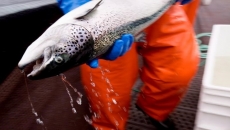British Columbia is decreasing the time between COVID-19 vaccinations to eight weeks.
Provincial health officer Dr. Bonnie Henry says there is now sufficient Moderna and Pfizer-BioNTech vaccine to move up the interval for the booster shot to about eight weeks.
Join Adrian Dix, Minister of Health, and Dr. Bonnie Henry, BC’s provincial health officer, for an update on COVID-19. #CovidBC https://t.co/8S5ljnpAYQ
— BC Government News (@BCGovNews) May 27, 2021
Henry says the second dose is important for the individual and is added protection for the community.
B.C. was the first province to extend the length of time between doses to a maximum of 16 weeks in order to spread the protection throughout the population while there was a shortage of the vaccines.
Henry says the rollout of the second doses will be similar to the first dose — those at the greatest risk will be at the top of the list for the second dose.
She says seniors, elders, Indigenous people and those clinically extremely vulnerable will be getting their invitations to book a second shot starting today.
Henry says they'll try to ensure that everyone gets the same vaccine they were first administered, but a shortage of Moderna may mean that people will have to substitute it for a Pfizer shot.
She said the National Advisory Committee on Immunization has reviewed the evidence on using different vaccines and has updated the guidance confirming that while it is preferable to have the same product, it's not always possible.
"If that is the case, we now have good evidence that it's safe to have an alternative of the same type of vaccine."
Pfizer and Moderna are the same type of vaccines, she said so mixing and matching is okay.
"This is the approach that we will be taking. As much as possible we'll try to make sure that everybody gets the second dose with the same product they had for their first dose," she said.
Henry says everyone who is eligible should have their second dose of vaccine by the end of the summer.
This report by The Canadian Press was first published May 27, 2021.






